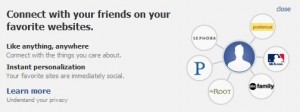This post was written following months of mounting concern about the way new sharing and connection features are being implemented on the most popular social networks. If you agree with what we ask of social network developers, feel free to quote this blog, or tweet marking your messages #SNprivacy. Journalism.co.uk will be putting more questions about privacy policy to Facebook later this week. To have your say, please leave comments below, tweet @journalismnews, or email judith [at] journalism.co.uk.
Re: Privacy policy
Dear social networks,
You say you want to reflect real world relationships and connections. Well, in the real world there are connections and information that journalists don’t want made public, shared or given to third parties. Please help us protect our privacy, so vital to responsible journalistic work. It will help you avoid law suits and government inquiries, too.
We know that we need you to help us work more effectively as journalists, to share with others, and to make connections in ways impossible before your birth. But likewise social networks need users and their endorsement. Google’s head of public policy and government relations, Susan Pointer, recently said: “We live or die by the trust our users have in our services.”
Social networks also rely on bloggers and technology/media journalists to communicate new and changed tools accurately.
We realise there is some shoddy and inaccurate reporting around social networking, especially in some of the mainstream press, but there are also many writers who care about relaying information responsibly.
We believe changes to Facebook’s privacy settings are particularly worrying for journalists and bloggers, who have good reason for protecting their privacy and confidential sources.
 As the US blogger and librarian Bobbi L. Newman reported, users now have to ‘opt out’ of auto-personalisation settings that allow their friends to share their content.
As the US blogger and librarian Bobbi L. Newman reported, users now have to ‘opt out’ of auto-personalisation settings that allow their friends to share their content.
Furthermore, as developer Ka-Ping Yee exposed, privacy breaches were made in the original open API which allowed external access to Facebook users’ ‘event’ information. We are pleased to see Facebook has reacted to this and corrected the privacy error.
 We believe Google Buzz was naive in setting up auto-connections between contacts in Gmail address books. The public availability of email addresses on Buzz, as reported by TechCrunch, was also of concern. We are pleased to see Google has amended these privacy errors.
We believe Google Buzz was naive in setting up auto-connections between contacts in Gmail address books. The public availability of email addresses on Buzz, as reported by TechCrunch, was also of concern. We are pleased to see Google has amended these privacy errors.
Journalism.co.uk has recently revealed misleading information surrounding Address Book Importing (ABI), which we feel does not adequately explain how social networks are using – and keeping – users’ email address book information.
 We argue that the default options should always be set so that the privacy of the user is respected. With friend friend finder tools, like Facebook’s, users should have to opt in to share email addresses and opt in to each one shared.
We argue that the default options should always be set so that the privacy of the user is respected. With friend friend finder tools, like Facebook’s, users should have to opt in to share email addresses and opt in to each one shared.
It’s an issue publicly highlighted by Facebook’s former chief privacy officer, Chris Kelly (currently running for office as attorney general in California): he is calling on Facebook “to structure all its programs to allow Facebook users to give permission before their information is shared with third parties”.
We are worried by Twitter and Friendster’s lack of engagement with us on privacy and ABI issues.
Facebook, with which we did enter lengthy dialogue, has said it welcomes feedback. Nonetheless, we are concerned it continues to dismiss the issues thrown up by its friend suggestions and connection features, which are implemented with harvested email addresses. Наши друзья: porno365.plus желают вам хороших праздников и смотреть только качественное секс видео. порно 365 это жемчужина в мире порнухи, куча роликов, много категорий и тегов, вы всегда можете сочетать теги и категории по вашим предпочтениям и найти то, что вы действительно хотели!
In light of the privacy breaches and concerns outlined above, we ask six things of growing social networks.
1. Please conduct thorough user research before you implement new features
2. Please publicise new features before you launch them fully, allowing us time to change new or existing privacy settings as necessary
3. If you change privacy settings, please ask us to opt *in*, not opt *out*. Social networks should NEVER set the default option to share users’ information
4. Please provide clearer explanations about how data is shared and how connections are made
5. Please test your new features more thoroughly before launching
6. Please answer our emails or postings on your forums about privacy concerns and reports of privacy breaches – written as either users or journalists / bloggers
Note to bloggers: please feel free to reproduce this plea on your own blogs, with a link back to the original post.